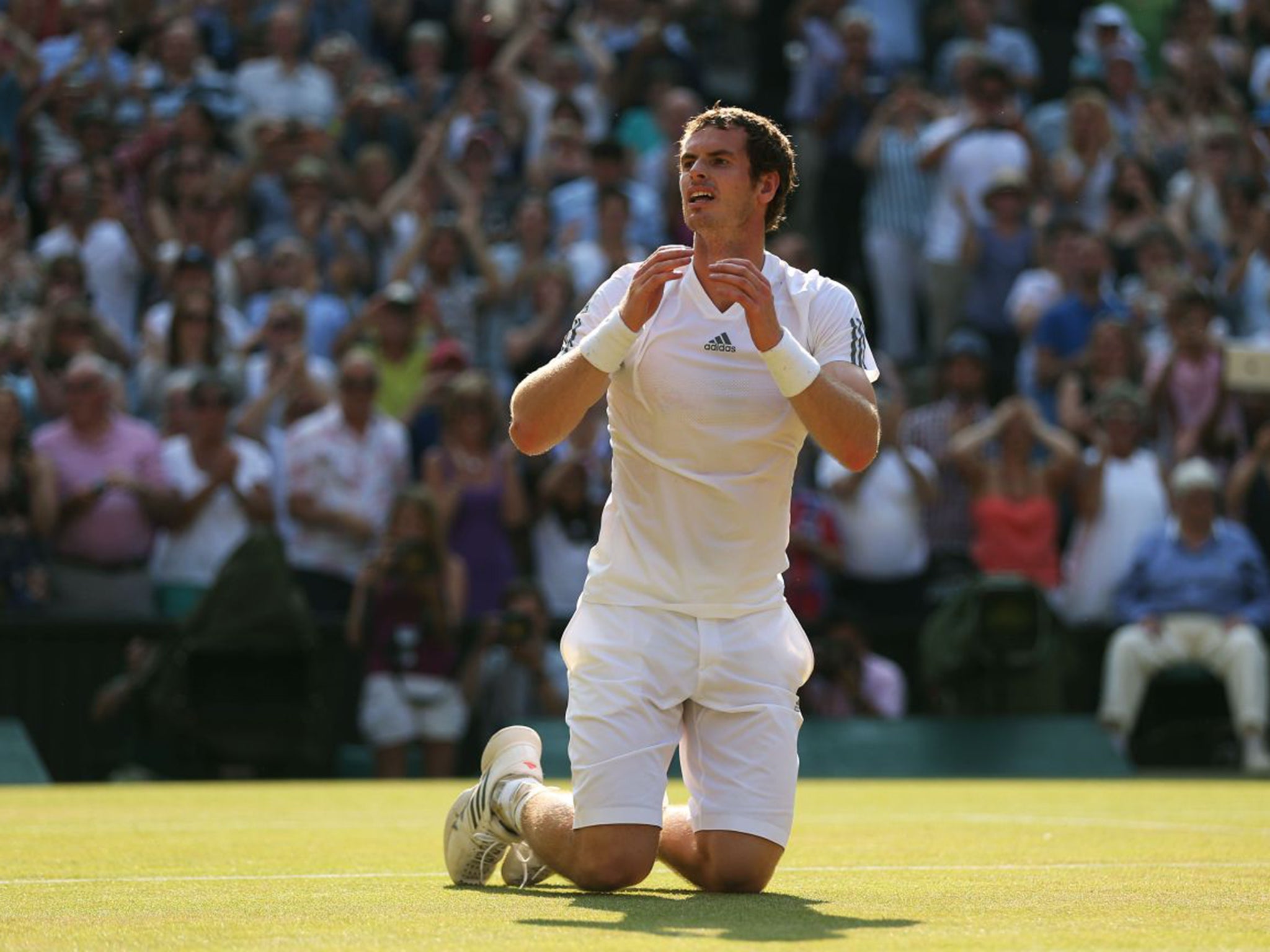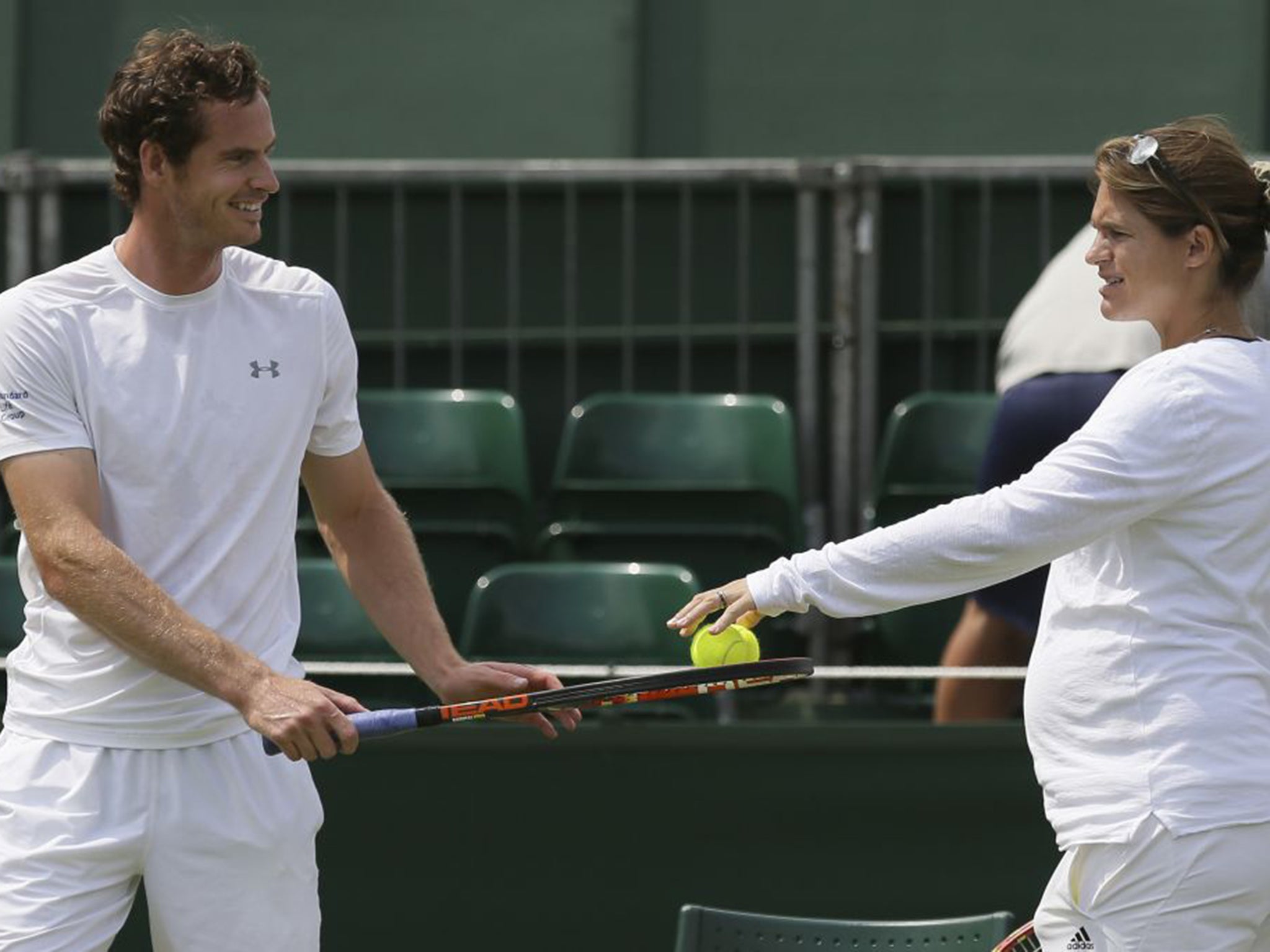Wimbledon 2015: Andy Murray minded to be champion once again
On the 10th anniversary of his SW19 debut, Scot believes he is better equipped than ever to take the crown after sessions with a psychiatrist

Your support helps us to tell the story
From reproductive rights to climate change to Big Tech, The Independent is on the ground when the story is developing. Whether it's investigating the financials of Elon Musk's pro-Trump PAC or producing our latest documentary, 'The A Word', which shines a light on the American women fighting for reproductive rights, we know how important it is to parse out the facts from the messaging.
At such a critical moment in US history, we need reporters on the ground. Your donation allows us to keep sending journalists to speak to both sides of the story.
The Independent is trusted by Americans across the entire political spectrum. And unlike many other quality news outlets, we choose not to lock Americans out of our reporting and analysis with paywalls. We believe quality journalism should be available to everyone, paid for by those who can afford it.
Your support makes all the difference.There are certain situations you can prepare for, but as Andy Murray waited to go on Centre Court before his historic victory in the Wimbledon final two years ago, nerves got to him. “Forty minutes before I went on the court I didn’t know what was happening to my body, what was going on,” Murray recalled last week. “I was so nervous. I had felt absolutely fine in the morning. So when that came, I was like, ‘Why was I not feeling that way two hours ago? What’s going on?’”
The nerves might be the same if Murray is in the same situation a fortnight, but at least he will know what is happening and why. The Scot has often been sceptical about the use of sports psychologists, but he has been taking a keen interest recently in how the mind works. He has been seeing a psychiatrist and believes that as a result he has a better understanding of how and why he reacts to certain situations.
The world No 3 has always given the impression that there is plenty going on in his head. Whether he is conducting a running dialogue with himself between points, screaming in the general direction of his entourage or pulling at various parts of his body that may or not be hurting, the Scot is invariably an interesting study for would-be mind-readers.
“I’m interested in learning the science behind it and why the brain works in certain ways and why you may react or say things at certain times,” Murray said. “I’ve tried to learn and understand myself better. When you do that you know you can cut yourself some slack sometimes.
“I used a lot of sports psychologists when I was younger. Sometimes it helped and sometimes it didn’t feel like it did. But the stuff I’m doing now, I’m actually interested in learning about how the brain works rather than being told how to count to 10, or whatever it is, to calm yourself down – which, for me, didn’t help.”

Murray, who will play his first match on Tuesday against Kazakhstan’s Mikhail Kukushkin, stressed that the professional he is seeing is a psychiatrist and not a “mind guru” or psychologist. “There is a difference, so he tells me, between a psychiatrist and a psychologist,” Murray said. “I don’t know exactly what it is, but the work I’m doing is different to the work I was doing in the past. I find it extremely interesting. And when you see how you react in certain situations it’s like, ‘Yeah, that’s correct.’
“But the thing is you need to be honest when you’re speaking to someone about those things. Because if you aren’t, you’re just wasting your time. You have to be open and honest about the thoughts that you’re having and the feelings that you have. If you don’t and you lie about things to make yourself look stronger and tougher, it’s pointless. Because everyone has those thoughts.”
So-called “mind games” are used in tennis as much as in other sports. For example, taking toilet breaks or sending for the trainer are tactics that might be used to break an opponent’s rhythm. Some players exaggerate their injuries and then surprise their opponents by coming back stronger than before.
However, Murray said this was not an area he had been exploring. “I haven’t necessarily learned about mind games and how to throw your opponent off. It’s more about understanding myself better. I think the better you understand yourself, it does help you before big matches.”
Hence Murray’s belief that he would be better equipped if he were to reach the Wimbledon final again. “If that was to happen in a couple of weeks and I was in that position I’d be like, ‘OK, I know what’s actually going on here, I know why this is happening and why I’m thinking this way – and it’s fine.’ I would know better how to deal with that now.”
Murray also hopes that a better understanding of his mind will prevent a repeat of the early-season slumps he used to suffer.
“Some years, after the Australian Open I struggled for three months,” he said. “I didn’t know why. I was obviously upset and disappointed and didn’t really get over those losses for quite a long time, whereas now I don’t see that sort of thing happening. It could still happen but it will be for different reasons.”
A healthy body can be just as important as a steady state of mind and Murray is spending more time than ever on maintaining his fitness. Returning after back surgery at the end of 2013 required a huge amount of rehabilitation work, but Murray also appreciates he is now 28 and has to look after his body. This year will be the 10th anniversary of his Wimbledon debut. “I worked extremely hard before, but now I understand my own body more and the things I need to do to make me feel good. I’m doing a lot more stretching and spending a lot more time with my physios, a lot more time warming up for practices and training.
“I’m not saying I was unprofessional back then, but you just learn things as you go along on the tour and I’m doing everything as best as I can. I know I’m not young any more and that I might not play for more than four or five more years – if I’m lucky. I maybe only have a couple more years left at the top of the game. I want to make the most of it. I’m doing everything better now. I’m eating better as well.”
As for his tennis, Murray thinks he is playing better than two years ago, when he won Wimbledon. “I feel like I’m serving a bit better than I was then. Physically I don’t have the problem with my back now. It helps my backhand, it helps my movement for that side of the court as well. It’s small things but they make a big difference for me.
“Being pain-free has helped me mentally as well. It’s helped my training. It’s helped me enjoy tennis a lot more. When you’re playing and your body is very sore and you’re in pain when you’re hitting certain shots, it’s fine at the beginning but after two years it’s hard.”
Not so long ago Murray put nearly all his focus on the Grand Slam events, but his new-found determination to play well throughout the year has been reflected in his results. He has won six tournaments since last September. “I regret a little bit not being more focused throughout the rest of the year because I feel like when I’m in the right frame for every tournament I give myself more chances to win more events,” he said. “I’m coming towards the latter stage of my career. I hope I still have five or six more years left, but I want to make the most of it.”
And what about the health of his pregnant coach, Amélie Mauresmo, who is expecting her first baby in August? Did Murray have any concerns about how she might cope with the stresses of Wimbledon?
“She went to see her doctor the Thursday after the French Open,” Murray said. “Her doctor gave her the all-clear. But there’s no way I would have Amélie there on her own during Wimbledon because you never know what can happen. So it’s great she’ll be there, but having Jonas [Bjorkman] there is essential. I’m glad they’ll both be there and hopefully Amélie will be feeling good.”
Andy’s turn? The gang of four
Since 2003, the Wimbledon men’s singles title has only been won by one of the Big Four: Roger Federer (eight times), Rafa Nadal (twice), Novak Djokovic (twice) and Andy Murray (once). They are all in the field this year, so who will be next?
2003 Federer (beat Philippoussis in the final)
2004 Federer (Roddick)
2005 Federer (Roddick)
2006 Federer (Nadal)
2007 Federer (Nadal)
2008 Nadal (Federer)
2009 Federer (Roddick)
2010 Nadal (Berdych)
2011 Djokovic (Nadal)
2012 Federer (Murray)
2013 Murray (Djokovic)
2014 Djokovic (Federer)
Join our commenting forum
Join thought-provoking conversations, follow other Independent readers and see their replies
Comments